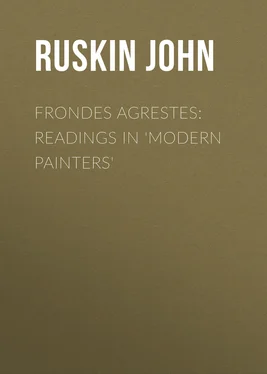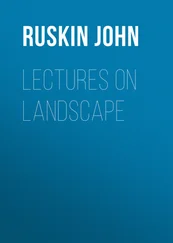John Ruskin - Frondes Agrestes - Readings in 'Modern Painters'
Здесь есть возможность читать онлайн «John Ruskin - Frondes Agrestes - Readings in 'Modern Painters'» — ознакомительный отрывок электронной книги совершенно бесплатно, а после прочтения отрывка купить полную версию. В некоторых случаях можно слушать аудио, скачать через торрент в формате fb2 и присутствует краткое содержание. Издательство: Иностранный паблик, Жанр: foreign_antique, foreign_home, literature_19, visual_arts, на английском языке. Описание произведения, (предисловие) а так же отзывы посетителей доступны на портале библиотеки ЛибКат.
- Название:Frondes Agrestes: Readings in 'Modern Painters'
- Автор:
- Издательство:Иностранный паблик
- Жанр:
- Год:неизвестен
- ISBN:нет данных
- Рейтинг книги:5 / 5. Голосов: 1
-
Избранное:Добавить в избранное
- Отзывы:
-
Ваша оценка:
- 100
- 1
- 2
- 3
- 4
- 5
Frondes Agrestes: Readings in 'Modern Painters': краткое содержание, описание и аннотация
Предлагаем к чтению аннотацию, описание, краткое содержание или предисловие (зависит от того, что написал сам автор книги «Frondes Agrestes: Readings in 'Modern Painters'»). Если вы не нашли необходимую информацию о книге — напишите в комментариях, мы постараемся отыскать её.
Frondes Agrestes: Readings in 'Modern Painters' — читать онлайн ознакомительный отрывок
Ниже представлен текст книги, разбитый по страницам. Система сохранения места последней прочитанной страницы, позволяет с удобством читать онлайн бесплатно книгу «Frondes Agrestes: Readings in 'Modern Painters'», без необходимости каждый раз заново искать на чём Вы остановились. Поставьте закладку, и сможете в любой момент перейти на страницу, на которой закончили чтение.
Интервал:
Закладка:
17. Examine the nature of your own emotion, (if you feel it,) at the sight of the Alps; and you find all the brightness of that emotion hanging, like dew on a gossamer, on a curious web of subtle fancy and imperfect knowledge. First you have a vague idea of its size, coupled with wonder at the work of the great Builder of its walls and foundations; then an apprehension of its eternity, a pathetic sense of its perpetualness, and your own transientness, as of the grass upon its side;—then, and in very sadness, a sense of strange companionship with past generations, in seeing what they saw. They did not see the clouds that are floating over your head, nor the cottage wall on the other side of the field, nor the road by which you are travelling. But they saw that . The wall of granite in the heavens was the same to them as to you. They have ceased to look upon it; you will soon cease to look also, and the granite wall will be for others. Then, mingled with these more solemn imaginations, come the understandings of the gifts and glories of the Alp;—the fancying forth of all the fountains that well from its rocky walls, and strong rivers that are born out of its ice, and of all the pleasant valleys that wind between its cliffs, and all the châlets that gleam among its clouds, and happy farmsteads couched upon its pastures; while, together with the thoughts of these, rise strange sympathies with all the unknown of human life, and happiness, and death, signified by that narrow white flame of the everlasting snow, seen so far in the morning sky. These images, and far more than these, lie at the root of the emotion which you feel at the sight of the Alps. You may not trace them in your heart, for there is a great deal more in your heart, both of evil and good, than you can ever trace; but they stir you and quicken you for all that. Assuredly, so far as you feel more at beholding the snowy mountain than any other object of the same sweet silvery grey, these are the kind of images which cause you to do so; and observe, these are nothing more than a greater apprehension of the facts of the thing. We call the power 'Imagination,' because it imagines or conceives; but it is only noble imagination, if it imagines or conceives the truth . And according to the degree of knowledge possessed, and of sensibility to the pathetic or impressive character of the things known, will be the degree of this imaginative delight.
18. So natural is it to the human heart to fix itself in hope rather than in present possession, and so subtle is the charm which the imagination casts over what is distant or denied, that there is often a more touching power in the scenes which contain far-away promises of something greater than themselves, than in those which exhaust the treasures and powers of nature in an unconquerable and excellent glory, leaving nothing more to be by fancy pictured or pursued. I do not know that there is a district in the world more calculated to illustrate this power of the expectant imagination than that which surrounds the city of Fribourg in Switzerland, extending from it towards Berne. It is of grey sandstone, considerably elevated, but presenting no object of striking interest to the passing traveller; so that as it is generally seen in the course of a hasty journey from the Bernese Alps to those of Savoy, it is rarely regarded with any other sensation than that of weariness, all the more painful because accompanied with reaction from the high excitement caused by the splendour of the Bernese Oberland. The traveller—foot-sore, feverish, and satiated with glacier and precipice,—lies back in the corner of the diligence, perceiving little more than that the road is winding and hilly, and the country through which it passes, cultivated and tame. Let him, however, only do this tame country the justice of staying in it a few days, until his mind has recovered its tone, and take one or two long walks through its fields, and he will have other thoughts of it. It is, as I said, an undulating district of grey sandstone, never attaining any considerable height, but having enough of the mountain spirit to throw itself into continual succession of bold slope and dale; elevated, also, just far enough above the sea to render the pine a frequent forest tree along its irregular ridges. Through this elevated tract the river cuts its way in a ravine some five or six hundred feet in depth, which winds for leagues between the gentle hills, unthought of until its edge is approached; and then, suddenly, through the boughs of the firs, the eye perceives, beneath, the green and gliding stream, and the broad walls of sandstone cliff that form its banks; hollowed out where the river leans against them, at its turns, into perilous over-hanging; and, on the other shore, at the same spots, leaving little breadths of meadow between them and the water, half overgrown with thicket, deserted in their sweetness, inaccessible from above, and rarely visited by any curious wanderers along the hardly traceable footpath which struggles for existence beneath the rocks. And there the river ripples and eddies and murmurs in an outer solitude. It is passing through a thickly peopled country; but never was a stream so lonely. The feeblest and most far-away torrent among the high hills has its companions; the goats browse beside it; and the traveller drinks from it, and passes over it with his staff; and the peasant traces a new channel for it down to his mill-wheel. But this stream has no companions; it flows on in an infinite seclusion, not secret, nor threatening, but a quietness of sweet daylight and open air—a broad space of tender and deep desolateness, drooped into repose out of the midst of human labour and life; the waves plashing lowly, with none to hear them; and the wild birds building in the boughs, with none to fray them away; and the soft, fragrant herbs rising and breathing and fading, with no hand to gather them;—and yet all bright and bare to the clouds above, and to the fresh fall of the passing sunshine and pure rain. But above the brows of these scarped cliffs, all is in an instant changed. A few steps only beyond the firs that stretch their branches, angular, and wild, and white, like forks of lightning, into the air of the ravine,—and we are in an arable country of the most perfect richness; the swathes of its corn glowing and burning from field to field: its pretty hamlets all vivid with fruitful orchards, and flowery garden, and goodly with steep-roofed storehouse and barn; its well-kept, hard, park-like roads rising and falling from hillside to hillside, or disappearing among brown banks of moss, and thickets of the wild raspberry and rose, or gleaming through lines of tall trees, half glade, half avenue, where the gate opens, or the gateless path turns trustedly aside, unhindered, into the garden of some statelier house, surrounded in rural pride with its golden hives, and carved granaries, and irregular domain of latticed and espaliered cottages, gladdening to look upon in their delicate homeliness—delicate, yet in some sort, rude; not like our English homes—trim, laborious, formal, irreproachable in comfort—but with a peculiar carelessness and largeness in all their detail, harmonizing with the outlawed loveliness of their country. For there is an untamed strength even in all that soft and habitable land. It is indeed gilded with corn, and fragrant with deep grass, but it is not subdued to the plough or to the scythe. It gives at its own free will; it seems to have nothing wrested from it, nor conquered in it. It is not redeemed from desertness, but unrestrained in fruitfulness,—a generous land, bright with capricious plenty, and laughing from vale to vale in fitful fulness, kind and wild. Nor this without some sterner element mingled in the heart of it. For, along all its ridges stand the dark masses of innumerable pines, 11 11 Almost the only pleasure I have, myself, in rereading my old books, is my sense of having at least done justice to the pine. Compare the passage in this book, No. 47.
taking no part in its gladness; asserting themselves for ever as fixed shadows, not to be pierced or banished even in the intensest sunlight; fallen flakes and fragments of the night, stayed in their solemn squares in the midst of all the rosy bendings of the orchard boughs and yellow effulgence of the harvest, and tracing themselves in black network and motionless fringes against the blanched blue of the horizon in its saintly clearness. And yet they do not sadden the landscape, but seem to have been set there chiefly to show how bright everything else is round them; and all the clouds look of pure silver, and all the air seems filled with a whiter and more living sunshine, where they are pierced by the sable points of the pines; and all the pastures look of more glowing green where they run up between the purple trunks; and the sweet field footpaths skirt the edges of the forest for the sake of its shade, sloping up and down about the slippery roots, and losing themselves every now and then hopelessly among the violets and ground-ivy and brown sheddings of the fibrous leaves, and at last plunging into some open aisle, where the light through the distant stems shows that there is a chance of coming out again on the other side; and coming out indeed in a little while from the scented darkness into the dazzling air and marvellous landscape, which stretches still farther and farther in new wilfulness of grove and garden, until at last the craggy mountains of the Simmenthal rise out of it, sharp into the rolling of the southern clouds.
Интервал:
Закладка:
Похожие книги на «Frondes Agrestes: Readings in 'Modern Painters'»
Представляем Вашему вниманию похожие книги на «Frondes Agrestes: Readings in 'Modern Painters'» списком для выбора. Мы отобрали схожую по названию и смыслу литературу в надежде предоставить читателям больше вариантов отыскать новые, интересные, ещё непрочитанные произведения.
Обсуждение, отзывы о книге «Frondes Agrestes: Readings in 'Modern Painters'» и просто собственные мнения читателей. Оставьте ваши комментарии, напишите, что Вы думаете о произведении, его смысле или главных героях. Укажите что конкретно понравилось, а что нет, и почему Вы так считаете.



![John Ruskin - Stones of Venice [introductions]](/books/732383/john-ruskin-stones-of-venice-introductions-thumb.webp)








